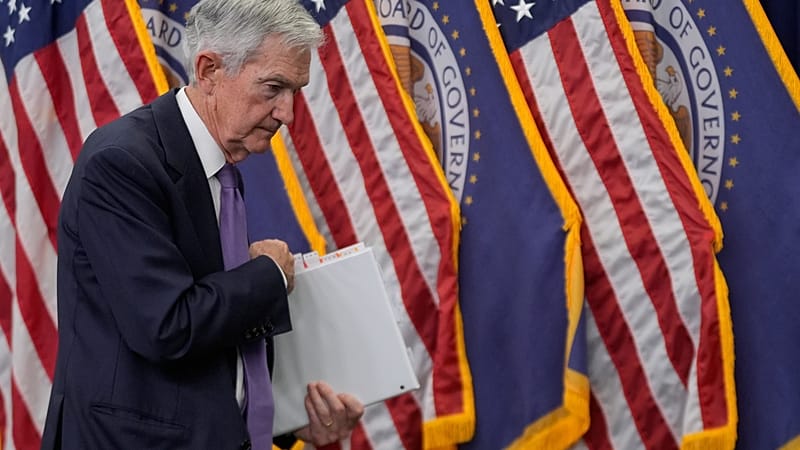What was once seen as a near-certain cut in interest rates next month now looks more like a coin flip as Federal Reserve officials sharply disagree over the economy’s health and whether stubborn inflation or weak hiring represent a bigger threat.
In several speeches in the past week, some policymakers have registered greater concern over persistent inflation in an echo of the “affordability” concerns that played a large role in elections earlier this month.
At the same time, another camp is much more concerned about meagre hiring and the threat that the “low-hire, low-fire” job market could worsen into one where layoffs become more widespread.
The turmoil on the Fed’s 19-member interest-rate setting committee reflects a deeply uncertain economic outlook brought about by multiple factors, including tariffs, artificial intelligence, and changes in immigration and tax policies.
“It’s reflective of a ton of uncertainty,” said Luke Tilley, chief economist at M&T Bank. “It’s not surprising at all that there’s a wide divergence of opinions.”
Fewer rate cuts by the Fed could leave borrowing costs for homes and cars elevated. More expensive mortgages and auto loans contribute to the widespread view, according to polls, that the cost of living is too high.
Some Fed watchers say that an unusually high number of dissents are possible at the December 9-10 meeting, regardless of whether the central bank reduces rates or not.
Krishna Guha, an analyst at Evercore ISI, said a decision to cut could lead to as many as four or five dissents, while a decision to keep rates unchanged could produce three.
Four dissenting votes would be highly unusual, given the Fed’s history of seeking consensus. The last time four officials dissented was in 1992, under then-Chair Alan Greenspan.
Related
Fed governor Christopher Waller on Monday noted that critics of the Fed often accuse it of “group think”, since many of its decisions are made unanimously.
“People who are accusing us of this, get ready,” Waller said Monday in remarks in London. “You might see the least group think you’ve seen … in a long time.”
The differences have been exacerbated by the government shutdown’s interruption of economic data, a particular challenge for a Fed that Chair Jerome Powell has often described as “data dependent”. The government’s last jobs report was for August, and inflation for September.
September jobs data will finally be published on Thursday, and are expected to show a small gain of 50,000 jobs that month and an unchanged unemployment rate at a still-low 4.3%.
For now, Wall Street investors put the odds of a December rate cut at 50-50, according to CME Fedwatch, down sharply from nearly 94% a month ago. The decline has contributed to the stock market’s drops this week.
After cutting their key rate in September for the first time this year, Fed policymakers signalled they expected to cut twice more, in October and December.
But after implementing a second reduction 29 October, Powell poured cold water on the prospects of another cut, describing it as “not a foregone conclusion — far from it”.
And speeches last week by a raft of regional Fed officials pushed the market odds of a December cut even lower. Susan Collins, president of the Federal Reserve Bank of Boston, said: “in all of my conversations with contacts across New England, I hear concerns about elevated prices.”
Collins said that keeping the Fed’s key rate at its current level of about 3.9% would help bring inflation down. The economy “has been holding up quite well” even with interest rates where they are, she added.
Several other regional presidents voiced similar concerns, including Raphael Bostic of the Atlanta Fed, Alberto Musalem of the St. Louis Fed, and Jeffrey Schmid at the Kansas City Fed. Musalem, Collins, and Schmid are among the 12 officials who vote on policy this year. Schmid dissented in October in favour of keeping rates unchanged.
“When I talk to contacts in my district, I hear continued concern over the pace of price increases,” Schmid said Friday. “Some of this has to do with the effect of tariffs on input prices, but it is not just tariffs — or even primarily tariffs — that has people worried. I hear concerns about rising health care costs and insurance premiums, and I hear a lot about electricity.”
On Monday, however, Waller argued that sluggish hiring is a bigger concern, and renewed his call for a rate cut next month.
“The labour market is still weak and near stall speed,” he said. “Inflation through September continued to show relatively small effects from tariffs and support the hypothesis that tariffs … are not a persistent source of inflation.”
Related
Waller also dismissed the concern — voiced by Schmid and others — that the Fed should keep rates elevated because inflation has topped the Fed’s 2% target for five years. So far that hasn’t led the public to worry that inflation will stay elevated for an extended period, Waller noted.
“You can’t just sort of say it’s been above target for five years, so I’m not going to cut,” he added. “You got to give us better answers than that.”
There could be consensus for an interest rate cut if, say, new data for October and November show the economy shedding jobs, according to Esther George, the former president of the Kansas City Fed.
It’s also worth noting that many economists had expected multiple dissents in September, but instead only Stephen Miran, a governor appointed that month by President Donald Trump, voted against the rate cut decision, in favour of an even bigger reduction.
“Registering a dissent is a hard decision, and I think you’re going to find people that are speaking today that wouldn’t follow through with a vote in that direction,” she said. “I think you’re going to find enough consensus, whichever way they go.”



Leave a Comment
Your email address will not be published. Required fields are marked *